最新人教版八级上册英语第五单元重点知识总结只是分享
八年级英语上册第五单元重要知识点汇总(人教版)
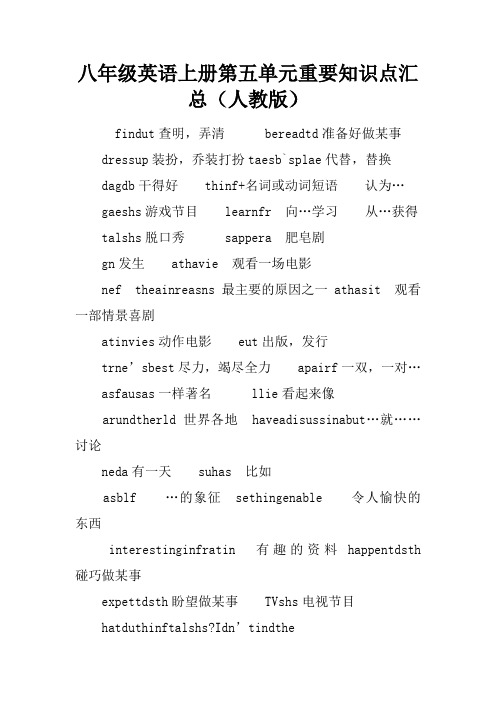
八年级英语上册第五单元重要知识点汇总(人教版)findut查明,弄清bereadtd准备好做某事dressup装扮,乔装打扮taesb`splae代替,替换dagdb干得好thinf+名词或动词短语认为…gaeshs游戏节目learnfr 向…学习从…获得talshs脱口秀sappera 肥皂剧gn发生athavie 观看一场电影nef theainreasns最主要的原因之一athasit 观看一部情景喜剧atinvies动作电影eut出版,发行trne’sbest尽力,竭尽全力apairf一双,一对…asfausas一样著名llie看起来像arundtherld世界各地haveadisussinabut…就……讨论neda有一天suhas 比如asblf …的象征sethingenable 令人愉快的东西interestinginfratin有趣的资料happentdsth 碰巧做某事expettdsth盼望做某事TVshs电视节目hatduthinftalshs?Idn’tindtheIhpetbeaTVreprternedaHabutu?常用法:letsbdsth让某人做某事plantdsth 计划做某事hpetdsth希望做某事inddingsth介意做某事expettdsth期待做某事Habutding…做某事怎么样?bealasreadtdsth总是准备做某事,随时随地可以从事某事trne’sbesttdsth 尽力做某事bee+ad变得…nts…as不像…那样…;不如…这么…thanufrdingsth谢谢你做某事Thanufrsth谢谢你的……lvedingsth喜爱做某事1thether,thethers,ther,thers,antherthether表示特指两个或者两部份中的另一个或另一部分,可直接单数名词或复数名词。
表示两个中的一个……另一个……时,常用ne…thether…。
人教版八年级英语上第五单元知识点总结

人教版八年级英语上5单元Unit5. Do you want to a game show?【重点短语】1. find out 查出/发现2. be ready to do 准备做…3. dress up 打扮/化妆成4. take one's place 代替某人5. do a good job 干的好/表演的出色6. think of 想到/思考7. game show 游戏节目8. learn from 向…...学习9. talk show 访谈节目10. soap opera 肥皂剧11. go on 继续12. watch a movie 看电影13. one of…其中之一14. try one’s best to =do one’s best to 竭尽全力15. a pair of 一双16. as famous as 一样闻名/出名17. look like 看起来像18. around the world 世界各地19. have a discussion about 讨论…...20. one day 有一天/某一天21. such as 例如22. a symbol of 一个象征/标志23. something enjoyable 快乐的事情24. interesting information 有趣的信息【重点句型】1. Some people might ask how this cartoon animal became so popular.有些人可能会问这个卡通动物怎样变得如此受欢迎了呢。
2. Mickey was like a common man, but he always tried to face any danger. Mickey.象一个普通人,但是他总是努力面对任何危险。
3. Mickey was unlucky and had many problems such as losing his house or girlfriend.Mikey是不幸的,总是面对很多问题,如失去房子或女朋友等。
最全面人教版八年级上册英语第五单元知识点归纳总结

Unit 5 Do you want to watch a game show?一、词汇与短语● 重点单词A部分1.sitcom n. 情景喜剧2.news n. 新闻节目;新闻3.mind v.介意;对(某事)烦恼4.stand v. 忍受;站立cational adj.教育的;有教育意义的6.plan v. & n. 几打算;计划7.hope v. & n. 希望8.discussion n. 讨论;商量9.happen v. 发生;出现10.expect v. 预料;期待11.joke n. 笑话;玩笑edy n. 喜剧;喜剧片B部分1.meaningless adj.毫无意义的;意思不明确的2.action n. 行动3.cartoon n. 动画片;卡通片4.culture n. 文化;文明5.famous adj. 著名的;出名的6.appear v. 出现7.become v. 开始变得;变成8.rich adj. 富有的9.successful adj. 获得成功的;有成就的10.might modal v. 可能;可以11.main adj. 主要的;最重要的12.reason n. 原因;理由mon adj. 普通的;常见的14.film n. 电影15.unlucky adj. 不幸的;不吉利的16.lose v. 失去;丢失17.ready adj. 愿意的;准备好的18.character n. 人物;角色19.simple adj. 简单的;易做的20.army n. 陆军;陆军部队● 重点短语A部分1.talk show 谈话类节目2.game show 游戏类节目3.soap opera 肥皂剧4.sports show 运动类节目5.think of 想起;认为6.plan to do sth. 计划做某事7.hope to do sth. 希望做某事8.my favorite TV shows 我最喜欢的电视节目9.go on 发生10.have a discussion about 就…进行讨论11.expect to do sth. 期望做某事12.learn from 向…学习B部分1.action movie 动作影片2.over 80 years ago 八十多年前e out 出版;发行4.in the 1930s 在20世纪30年代5.try one's best 尽某人最大努力6.one of the main reasons 主要原因之一7.dress up 装扮;乔装打扮8.be ready to 准备好(做某事);愿意(做某事)9.do a good job 干得好10.take sb.'s place代替某人;替换某人● 重点句子A部分1.--What do you think of talk shows? “你认为访谈类节目怎么样?”--I don't mind them. /I can't stand them. /I love watching them.“我不介意它们。
人教版八年级上册第五单元重点

Unit 5 Do you want to watch a game show?重点单词:Educational adj. 教育的;有教育意义的Happen v. 发生;出现Meaningless adj. 毫无意义的;意思不明确的Cartoon n. 动画片,卡通片Famous adj. 著名的,出名的Successful adj. 获得成功的;有成就的Unlucky adj. 不幸的;不吉利的Discussion n.讨论,商量Expect v.预料,期待Culture n. 文化;文明Appear v. 出现Reason n. 原因;理由Ready adj. 愿意的;准备好的重点短语:Find out 查明,弄清be ready to 愿意迅速做某事Dress up 装扮,乔装打扮take sb.’s place 代替;替换Do a good job 干得好think of 认为Learn from 从、、、、、获得;向、、、、、学习talk show 访谈节目Game show 游戏节目soap opera 肥皂剧Go on 发生watch a movie 看电影One of 、、、、、、之一 a pair of 一双,一对Try one’s best 尽某人最大的力look like 看起来像As famous as 与、、、、、、一样有名around the world 全世界Have a discussion about 就、、、、、、讨论one day 有一天Such as 例如 a symbol of 、、、、、、的象征Do a good job 干得好something enjoyable 令人愉快的东西Interesting information 有趣的资料重点短语Let sb. do sth 让某人做某事Plan to do sth 计划/打算做某事Hope to do sth 希望做某事Happen to do sth 碰巧做某事Expect to do sth. 盼望做某事How about doing…? 做、、、、、、怎么样?Be ready to do sth. 愿意迅速做某事Try one’s best to do sth. 某人尽力做某事重点语法:动词不定式作宾语例句:She plans to watch Days of Our Past tonight. 她打算今晚看《我们过去的日子》Because I hope to find out what’s going on around the world.因为我希望了解全世界各地正在发生的事。
人教版八年级上册英语Unit5知识点梳理及语法讲义(学生版)
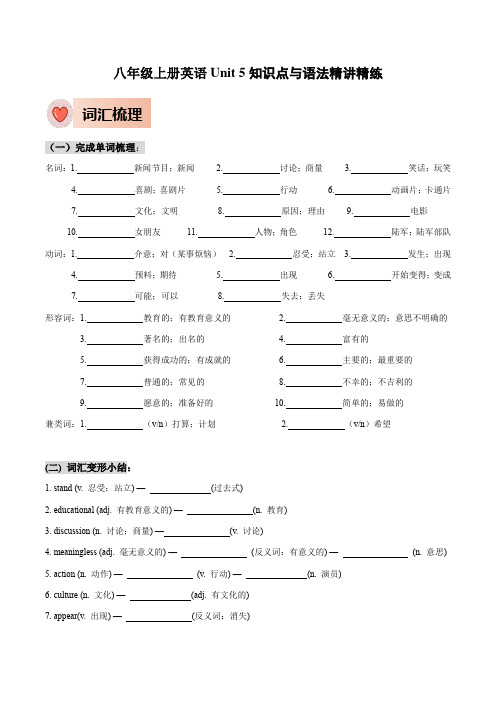
八年级上册英语Unit 5知识点与语法精讲精练词汇梳理(一)完成单词梳理:名词:1. 新闻节目;新闻 2. 讨论;商量 3. 笑话;玩笑4. 喜剧;喜剧片5. 行动6. 动画片;卡通片7. 文化;文明8. 原因;理由9. 电影10. 女朋友11. 人物;角色12. 陆军;陆军部队动词:1. 介意;对(某事烦恼) 2. 忍受;站立 3. 发生;出现4. 预料;期待5. 出现6. 开始变得;变成7. 可能;可以8. 失去;丢失形容词:1. 教育的;有教育意义的 2. 毫无意义的;意思不明确的3. 著名的;出名的4. 富有的5. 获得成功的;有成就的6. 主要的;最重要的7. 普通的;常见的8. 不幸的;不吉利的9. 愿意的;准备好的10. 简单的;易做的兼类词:1. (v/n)打算;计划 2. (v/n)希望(二) 词汇变形小结:1. stand (v. 忍受;站立) — (过去式)2. educational (adj. 有教育意义的) — (n. 教育)3. discussion (n. 讨论;商量) — (v. 讨论)4. meaningless (adj. 毫无意义的) — (反义词:有意义的) — (n. 意思)5. action (n. 动作) — (v. 行动) — (n. 演员)6. culture (n. 文化) — (adj. 有文化的)7. appear(v. 出现) — (反义词:消失)8. bee(v. 变成) — (过去式)9. successful(adj. 成功的) — (adv. 成功地) — (n. 成功)— (v. 成功)10.unlucky(adj. 不幸的) — (反义词:幸运的)unluckily(adv. 不幸地) — (反义词:幸运地)11. lose(v. 失去;丢失) — (过去式)12. simple(adj. 简单的) — (adv. 简单地)【练一练】用所给词的适当形式填空1.The book is very ___________(education). You can learn a lot from it.2.The students are having a ____________(discuss) about these TV programs.3.The boy ____________(stand) up and then ran away.4.Tom and Jerry is a ____________ (success) cartoon. People of all ages like it.5.It’s time for us to put the plan into ____________ (act).6.We shouldn’t spend much time on _____________ (meaning) things every day.7.A bus ____________(appear)in the corner when I was planning to take a taxi.8.Guo Jingjing worked hard and ____________(bee)an excellent athlete(运动员).9.He was so unlucky that he fell off the bike yesterday. ____________, he wasn't hurt badly.(lucky)10.When I got to the city, I____________(lose)my way.(三) 短语攻关:肥皂剧查明;弄清动作影片准备好(做某事)装扮;乔装打扮代替;替换干得好访谈节目从……学到出现;出版世界各地认为打算做某事不能忍受做某事1.What do you think of talk shows? 你认为访谈节目怎么样?【用法详解】 重点:“What do you think of...?”相当于“How do you like...?”或“How do you feel about...?”意为“你认为……怎么样?”,常用来询问对方对某事/某人的看法。
八年级英语人教版上册Unit5_单元必考知识点汇总

Unit 5Do you want to watch a game show?❖重要知识点 shows:talk shows访谈节目soap operas肥皂剧sports shows体育节目sitcoms情境喜剧game shows游戏节目talent shows才艺秀news 新闻(不可数名词)2.different kinds of movies:(不同种类的电影)comedies 喜剧片action movies动作电影cartoons动画片scary movies恐怖片3.用于评价的形容词:☺interesting有趣的wonderful精彩的enjoyable令人愉快的relaxing令人放松的exciting令人兴奋的educational有教育意义的☹ boring无聊的serious严肃的meaningless毫无意义的4.What do you think of ... ? = How do you like...? 你认为.......怎么样?—What do you think of talk shows ?—I love them. / I like them./ I don’t mind them. 我不介意它们。
/ I don’t like them. / I can’t stand them. 我不能忍受它们。
5.表达喜欢的电视节目以及说明原因(1)I like watching the news. I watch it every night. Because I think it’s educational. And I hope to find out what’s going on around the world.我喜欢看新闻, 我每天晚上都要看, 因为我认为它是有教育意义的, 并且我希望弄清全世界正在发生什么。
(2)I love soap operas. Although I can’t expect to learn much from them, I like to follow the story and see what happens next.我喜欢肥皂剧, 虽然我不能期待从中学到许多东西, 但是我喜欢跟随故事情节看接下来会发生什么。
最新版人教版八年级英语上册unit5知识点重难点
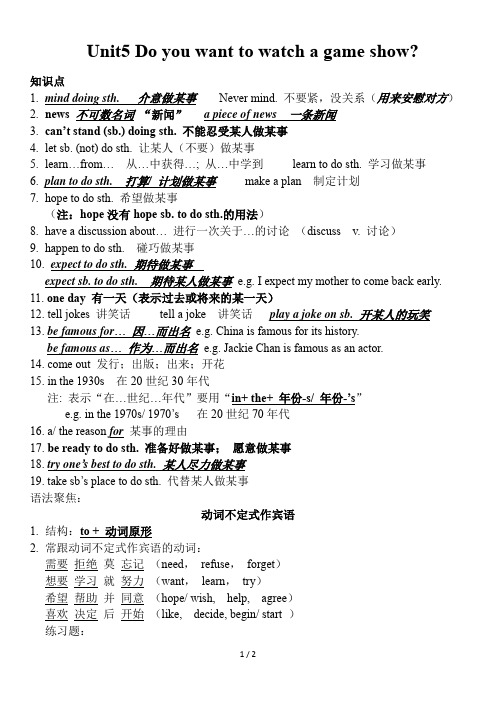
Unit5 Do you want to watch a game show?知识点1.mind doing sth. 介意做某事Never mind. 不要紧,没关系(用来安慰对方)2.news 不可数名词“新闻” a piece of news 一条新闻3.can’t stand (sb.) doing sth. 不能忍受某人做某事4.let sb. (not) do sth. 让某人(不要)做某事5.learn…from…从…中获得…; 从…中学到learn to do sth. 学习做某事6.plan to do sth. 打算/ 计划做某事make a plan 制定计划7.hope to do sth. 希望做某事(注:hope没有hope sb. to do sth.的用法)8.have a discussion about…进行一次关于…的讨论(discuss v. 讨论)9.happen to do sth. 碰巧做某事10.expect to do sth. 期待做某事expect sb. to do sth. 期待某人做某事e.g. I expect my mother to come back early.11. one day 有一天(表示过去或将来的某一天)12. tell jokes 讲笑话tell a joke 讲笑话play a joke on sb. 开某人的玩笑13.be famous for…因…而出名e.g. China is famous for its history.be famous as…作为…而出名e.g. Jackie Chan is famous as an actor.14. come out 发行;出版;出来;开花15. in the 1930s 在20世纪30年代注: 表示“在…世纪…年代”要用“in+ the+ 年份-s/ 年份-’s”e.g. in the 1970s/ 1970’s 在20世纪70年代16. a/ the reason for某事的理由17. be ready to do sth. 准备好做某事;愿意做某事18. try one’s best to do sth. 某人尽力做某事19. take sb’s place to do sth. 代替某人做某事语法聚焦:动词不定式作宾语1.结构:to + 动词原形2.常跟动词不定式作宾语的动词:需要拒绝莫忘记(need,refuse,forget)想要学习就努力(want,learn,try)希望帮助并同意(hope/ wish, help, agree)喜欢决定后开始(like, decide, begin/ start )练习题:1. —Did he tell you ______ joke?—No. He told me ______ interesting story.A. an; aB. a; aC. an; anD. a; an2. —Why do you love him?—I have no ______ for it. It is only a feeling.A. dreamB. habitC. reasonD. question3. Mrs. Qin isn’t here today. I’ll take her place ______ the park.A. cleaningB. cleanC. to cleanD. cleans4. —Your cousin can paint well. —Yes. He ______ his paintings.A. is famous forB. is famous asC. is good forD. is good with5. Lucy is so slow. I can't stand ______ for her so long.A.wait B.waiting C.to wait D.waited6. You can’t expect ______ a new language in a few months.A. learnB. learnedC. learningD. to learn7. What do you plan ______ during the holidays?A. doingB. to doC. doD. to doing8. —Did you ______ what was in that room at last? —Yes. It was a cat.A. come outB. find outC. bring outD. blow out9. Why do you like watching Who’s Still Standing ? — Because I can learn a lot it.A. fromB. ofC. forD. with10. His book ______ and he ______ famous.A.come out;become B.came out;becomesC.comes out;became D.came out;became11. Beijing is famous ______the Great Wall.A.as B.by C.to D.for12. —How about your basketball match last week?—Oh,we ______.We were all happy.A.did badly B.did a good job C.did good D.did a good work 13. What do you think of this book?—I don’t like it. I think it’s ______ (meaning).14. Mo Yan is a ______ (success) writer in China.15. The students are having a ______ (discuss) about how to learn English well.16. 王老师病了。
(完整版)人教版八年级英语上第五单元知识点总结
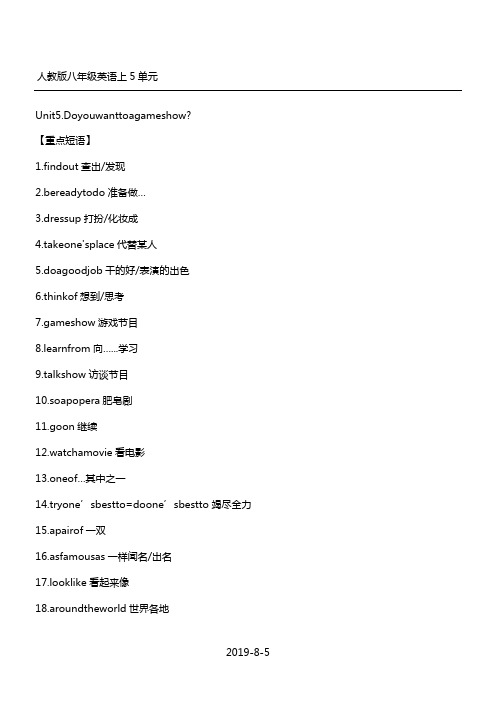
人教版八年级英语上5单元Unit5.Doyouwanttoagameshow?【重点短语】1.findout查出/发现2.bereadytodo准备做…6.thinkof11.goon15.apairof一双16.asfamousas一样闻名/出名17.looklike看起来像18.aroundtheworld世界各地19.haveadiscussionabout讨论…...20.oneday有一天/某一天21.suchas例如22.asymbolof一个象征/标志23.somethingenjoyable快乐的事情24.interestinginformation有趣的信息odWalkofFame.1978年11月18日,Mickey成为在好莱坞星光大道上拥有一颗星星的第一个卡通形象。
7.Today’scartoonsareusuallynotsosimpleaslittleMickeyMouse,buteveryonestillknowsandloveshim.今天的卡通通常都不如MickeyMouse那样简单,但是人人都知道他,热爱他。
8.WhohasapairofearsmorefamousthanMickey’s?谁有一双比Mickey的耳朵更闻名于世的呢?9.Ithinkthosemoviesaresomeaningless.我认为那些电影如此地毫无意义。
10.I’dliketofindoutwhatdifferentpeoplethinkofasubject.sitcom['sɪnews[njuːsoap[səʊplan[plæn]n.计划;方法v.打算;计划hope[həʊp].希望;期望;盼望n.希望discussion[dɪ'skʌʃn]n.讨论;谈论stand[stænd]v.站立;忍受happen['hæpən]vi.发生;碰巧;出现;偶遇may[meɪ]aux.可以,能够;可能,也许expect[ɪk'spekt]v.预期;期待;盼望joke[dʒəʊk]n.笑话;玩笑v.说笑话;开玩笑comedy['kɒmədi]n.喜剧;滑稽;幽默事件findout查明;弄清appear[ərich[rɪtʃmight[mamain[meɪreason['rifilm[fɪlm]n.电影unlucky[ʌn'lʌki]adj.倒霉的;不幸的;不吉利的lose[luːz]vt.丢失;失败vi.失败ready['redi]adj.准备好的;乐意的character['kærəktə(r)]n.个性;品质;人物;simple['sɪmpl]adj.简单的;朴素的;单纯的;笨的army['ɑːmi]n.军队;陆军;一大批actionmovie动作片bereadyto愿意迅速做某事dressup装扮;乔装打扮。
人教版八年级英语上册第五单元知识详解
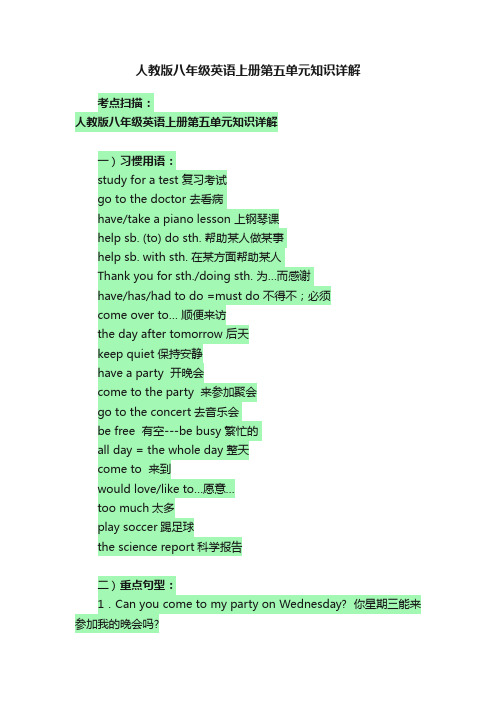
人教版八年级英语上册第五单元知识详解考点扫描:人教版八年级英语上册第五单元知识详解一)习惯用语:study for a test 复习考试go to the doctor 去看病have/take a piano lesson 上钢琴课help sb. (to) do sth. 帮助某人做某事help sb. with sth. 在某方面帮助某人Thank you for sth./doing sth. 为…而感谢have/has/had to do =must do 不得不;必须come over to… 顺便来访the day after tomorrow 后天keep quiet 保持安静have a party 开晚会come to the party 来参加聚会go to the concert去音乐会be free 有空---be busy 繁忙的all day = the whole day 整天come to 来到would love/like to…愿意…too much太多play soccer踢足球the science report科学报告二)重点句型:1.Can you come to my party on Wednesday? 你星期三能来参加我的晚会吗?2.Sorry.I can't.I have a piano lesson. 对不起,我不能。
我要上钢琴课。
3.Sure.I'd love to.当然,我愿意。
4.I'm playing soccer.我在踢足球。
5.I have too much homework(to do) this weekend .这个周末我有太多家庭作业(要做)。
6.I have to go to the doctor.我得去看医生。
7.I can't join you because I have to help my mom.我不能参加,因为我要帮我妈妈干活。
八年级上册英语人教版unit5知识点

八年级上册英语人教版unit5知识点本文旨在对八年级上册英语人教版Unit5的知识点进行总结和梳理,帮助同学们更好地学习和掌握相关知识。
1. 现在完成时现在完成时是指过去发生的动作或状态对现在造成影响。
现在完成时的构成是“have/has + 过去分词”。
例如:- I have finished my homework.(我已经完成了我的作业。
)- He has lived in Beijing for three years.(他已经在北京住了三年了。
)2. 现在完成时与过去时的区别现在完成时和过去时的区别在于时间表达上。
现在完成时强调目前的状态,而过去时强调发生在过去的动作。
例如:- I have been to the cinema.(现在完成时,强调现在的状态。
)- I went to the cinema yesterday.(过去时,强调发生在过去的动作。
)3. 以“ever”和“never”为标志的疑问句以“ever”和“never”为标志的疑问句通常用于询问某一行为或经历是否曾经发生过。
例如:- Have you ever been to Hong Kong?(你曾经去过香港吗?)- Have you never been to New York?(你从来没有去过纽约吗?)4. 介词“since”和“for”的用法介词“since”和“for”通常用于表示时间的长短。
其中,“since”表示从某个时间点开始到现在的时间长度,“for”则表示一段时间长度。
例如:- I have been learning English since 2010.(我从2010年开始学习英语。
)- I have been learning English for 10 years.(我已经学习英语10年了。
)5. 特殊的动词和介词搭配一些动词和介词的搭配是特殊的,需要特别注意。
例如:- listen to:听- look at:看- get up:起床- come back:回来以上就是八年级上册英语人教版Unit5的知识点总结和梳理。
八年级上册英语人教版第五单元笔记
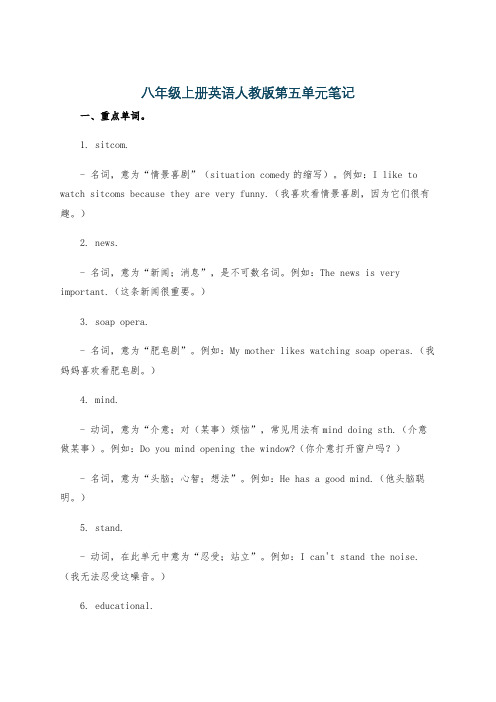
八年级上册英语人教版第五单元笔记一、重点单词。
1. sitcom.- 名词,意为“情景喜剧”(situation comedy的缩写)。
例如:I like to watch sitcoms because they are very funny.(我喜欢看情景喜剧,因为它们很有趣。
)2. news.- 名词,意为“新闻;消息”,是不可数名词。
例如:The news is very important.(这条新闻很重要。
)3. soap opera.- 名词,意为“肥皂剧”。
例如:My mother likes watching soap operas.(我妈妈喜欢看肥皂剧。
)4. mind.- 动词,意为“介意;对(某事)烦恼”,常见用法有mind doing sth.(介意做某事)。
例如:Do you mind opening the window?(你介意打开窗户吗?)- 名词,意为“头脑;心智;想法”。
例如:He has a good mind.(他头脑聪明。
)5. stand.- 动词,在此单元中意为“忍受;站立”。
例如:I can't stand the noise.(我无法忍受这噪音。
)6. educational.- 形容词,意为“教育的;有教育意义的”。
例如:This program is very educational.(这个节目很有教育意义。
)7. plan.- 名词,意为“计划;打算”。
例如:What's your plan for this weekend?(你这个周末的计划是什么?)- 动词,意为“计划;打算”,常见用法为plan to do sth.(计划做某事)。
例如:I plan to go to the park tomorrow.(我计划明天去公园。
)8. hope.- 动词,意为“希望”,常见用法为hope to do sth.(希望做某事)或hope + (that)从句。
人教版八年级上册英语第五单元重点知识总结
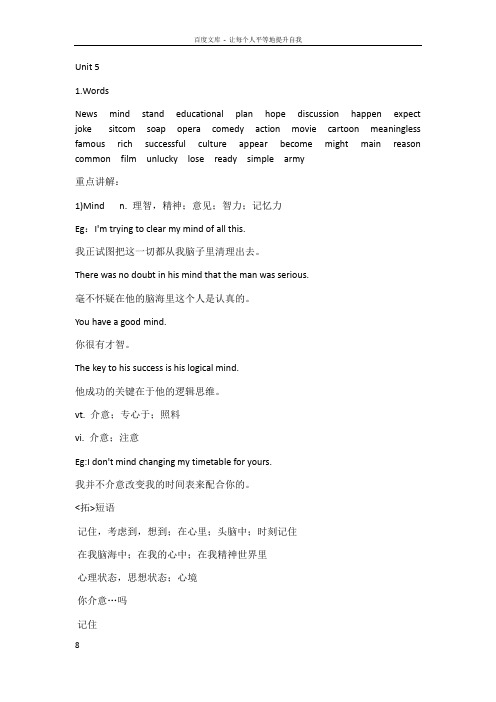
Unit 51.WordsNews mind stand educational plan hope discussion happen expect joke sitcom soap opera comedy action movie cartoon meaningless famous rich successful culture appear become might main reason common film unlucky lose ready simple army重点讲解:1)Mind n. 理智,精神;意见;智力;记忆力Eg:I'm trying to clear my mind of all this.我正试图把这一切都从我脑子里清理出去。
There was no doubt in his mind that the man was serious.毫不怀疑在他的脑海里这个人是认真的。
You have a good mind.你很有才智。
The key to his success is his logical mind.他成功的关键在于他的逻辑思维。
vt. 介意;专心于;照料vi. 介意;注意Eg:I don't mind changing my timetable for yours.我并不介意改变我的时间表来配合你的。
<拓>短语记住,考虑到,想到;在心里;头脑中;时刻记住在我脑海中;在我的心中;在我精神世界里心理状态,思想状态;心境你介意…吗记住2)Stand vi. 站立;位于;停滞vt. 使站立;忍受;抵抗n.忍受Eg:It eats in her to stand idly by.站在一旁无所事事,这使她很不好受。
How can you stand such insolence?你还能忍受这样的侮辱吗?Do you think you can swing him to our stand?你认为你能让他站到我们的立场上来吗?<拓>短语s v. 站起来;坚持;竖立;站得住脚;拥护坚持;依靠;代表;支持;象征;担任…的候选人突出;站出来;坚持到底;坚决反对支持;袖手旁观;准备;站在旁边无法忍受vt. 反对;抵抗退后;往后站;不介入3)Plan vt. 计划;设计;打算vi. 计划;打算Eg:They talked him out of his plan.他们说服他放弃他的计划。
人教版八年级英语上册Unit 5知识点整理汇编

人教版八年级英语上册Unit 5知识点整理汇编Unit 5 Can you come to my party? 知识点详解一、词汇精讲1、 suresure常用于口语中,为说话人较有把握的肯定回答,意为“当然可以,愿意”,相当于certainly或yes。
— May I use your pen? 我能用一下你的钢笔吗?— Sure. 当然可以。
【拓展】sure的其他用法:(1)祈使句“Be sure+不定式”表达说话人向对方所提出的要求,意为“务必,千万”。
Be sure to give it back in time. 务必要及时归还。
(2)“be sure+不定式”还可意为“一定,肯定”,往往表示说话人的一种推测或判断,主语可以是人,也可以是物。
It’s sure to rain tomorrow. 明天一定会下雨。
(3)be sure of/about表示主语“相信”或“对…有把握”,后接名词、代词或动词-ing形式,主语必须是人。
He is sure of success.= He is sure that he will succeed. 他自信会取得成功。
(4)“be sure+从句”表示“肯定,有把握”,主句的主语必须是人。
I’m sure who he is. 我知道他是谁。
2、情态动词can 的用法can是最常用的情态动词,其后接动词原形,否定形式为can’t。
(1)can表示有能力做或能够发生,有“能,会”的意思。
I can run fast. 我能跑得快。
She can speak Japanese. 她会说日语。
注意:can在表示“能力”时可与be able to互换使用,be able to 有更多的时态,常被用来表示can所不能表示的将来时或完成时。
They will be able to run the machine on their own in three months.三个月后,他们能自己操作这台机器。
人教版八年级英语上第五单元知识点总结材料
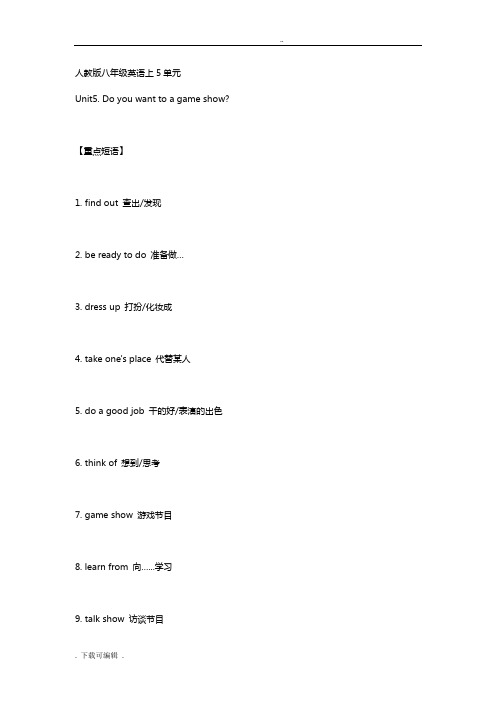
人教版八年级英语上5单元Unit5. Do you want to a game show? 【重点短语】1. find out 查出/发现2. be ready to do 准备做…3. dress up 打扮/化妆成4. take one's place 代替某人5. do a good job 干的好/表演的出色6. think of 想到/思考7. game show 游戏节目8. learn from 向…...学习9. talk show 访谈节目10. soap opera 肥皂剧11. go on 继续12. watch a movie 看电影13. one of…其中之一14. try one’s best to =do one’s best to 竭尽全力15. a pair of 一双16. as famous as 一样闻名/出名17. look like 看起来像18. around the world 世界各地19. have a discussion about 讨论…...20. one day 有一天/某一天21. such as 例如22. a symbol of 一个象征/标志23. something enjoyable 快乐的事情24. interesting information 有趣的信息【重点句型】1. Some people might ask how this cartoon animal became so popular.有些人可能会问这个卡通动物怎样变得如此受欢迎了呢。
2. Mickey was like a common man, but he always tried to face any danger. Mickey. 象一个普通人,但是他总是努力面对任何危险。
3. Mickey was unlucky and had many problems such as losing his house or girlfriend.Mikey是不幸的,总是面对很多问题,如失去房子或女朋友等。
人教版八年级上册英语第五单元重点知识总结

Unit 5 1.Words News mind stand educa onal plan hope discussion happen expect joke sitcom soap opera comedy ac on movie cartoon meaningless famous rich successful culture appear become might main reason common film unlucky lose ready simple army 重点讲解:重点讲解:1)Mind n. 理智,精神;意见;智力;记忆力理智,精神;意见;智力;记忆力Eg:I'm trying to clear my mind of all this. 我正试图把这一切都从我脑子里清理出去。
There was no doubt in his mind that the man was serious. 毫不怀疑在他的脑海里这个人是认真的。
You have a good mind. 你很有才智。
你很有才智。
The key to his success is his logical mind. 他成功的关键在于他的逻辑思维。
他成功的关键在于他的逻辑思维。
vt. 介意;专心于;照料介意;专心于;照料vi. 介意;注意介意;注意Eg:I don't mind changing my metable for yours. 我并不介意改变我的时间表来配合你的。
<拓>短语短语in mind 记住,考虑到,想到;在心里;头脑中;时刻记住记住,考虑到,想到;在心里;头脑中;时刻记住in my mind 在我脑海中;在我的心中;在我精神世界里state of mind 心理状态,思想状态;心境心理状态,思想状态;心境would you mind 你介意…吗keep in mind 记住记住2)Stand vi. 站立;位于;停滞vt. 使站立;忍受;抵抗忍受使站立;忍受;抵抗 n.忍受Eg:It eats in her to stand idly by. 站在一旁无所事事,这使她很不好受。
人教版八年级上册U5 知识点归纳

人教版八上U5重难知识点总结1. sitcom 情景喜剧n. watch sitcoms2. news 新闻;新闻节目n. news report新闻报道a piece of news一则新闻two pieces of newsnorth 北east 东west 西south 南3.mind介意v. mind doing 介意做某事mind sb/one’s doing sth介意某人做4. stand忍受v. can’t stand无法忍受can’t stand doing无法忍受做…5. education al教育的adj. (education n.)educational programs有教育意义的节目6. plan 打算,计划v.&n plan to do sth.计划做make a plan for为…制定一个计划7. hope希望v. be full of hope充满希望hope to do sth. 希望做…hope+ that 从句注意:没有hope sb to do sth.8. find out the truth查清真相9. discussion 讨论n. discuss v.have a discussion about就…进行讨论10. happen发生v. =take placewhat happened 发生了什么事?sth happen to sb.某人发生某事sb happen to do 某人碰巧做…11.expect v.期待,预料expect to learn from sitcoms希望从情景剧中学习expect to do sth. 期望做…expect sb. to do 期望某人做…12. joke 笑话n. tell jokes讲笑话13. meaning less毫无意义的adj. meaningful 有意义meaning 意义, 意思n.mean 意思是v.a meaningless comedy一部毫无意义的喜剧14. action行动n. action movies 动作片15. culture文化n. Chinese cultureforeign culture外国文化16. famous著名的adj. be famous for因为…出名be famous as作为…出名17. appear出现v. 反义词:disappear 消失first appear in the 1930s18.successful成功的adj. success n; succeed v;successfully adv.be successful in doing sth 成功做…20. might可能modalv. might come也许来21. main主要的adj. one of main reasons 主要原因之一22. common 普通的adj. a common man一个普通人common sense常识23. unlucky 不幸的adj. lucky, adv. unluckilyan unlucky day倒霉的一天24. lose 失去v. lose one’s house失去的家园lose one’s way 迷路lost adj. be/get lost 迷路25. ready准备好的adj. be ready to do准备/乐于做…26. simple简单的adj. not as/so simple as Chinese不像语文那么简单27. dress up 乔装打扮28.take sb’s place 代替,替换29.army陆军n. join the army 参军Army Day 建军节30 . in the 1930s在20世纪30年代in the 21st century 在21世纪31. come out 出版,发行32. learn a lot from 从…中学到很多。
人教版八年级英语上第五单元知识点总结
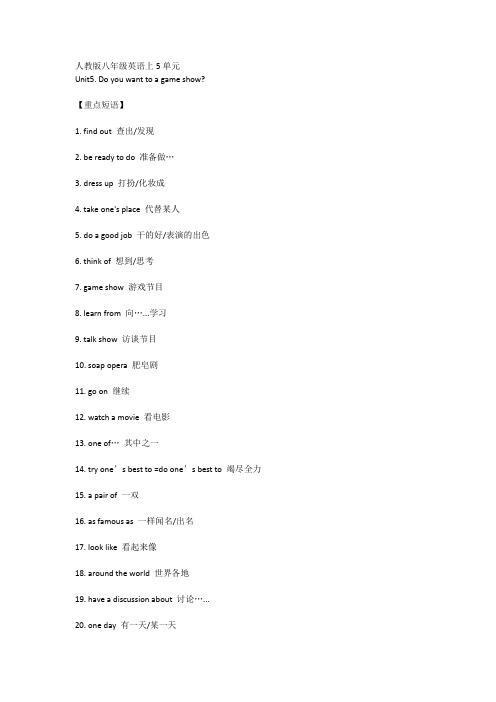
人教版八年级英语上5单元Unit5. Do you want to a game show?【重点短语】1. find out 查出/发现2. be ready to do 准备做…3. dress up 打扮/化妆成4. take one's place 代替某人5. do a good job 干的好/表演的出色6. think of 想到/思考7. game show 游戏节目8. learn from 向…...学习9. talk show 访谈节目10. soap opera 肥皂剧11. go on 继续12. watch a movie 看电影13. one of…其中之一14. try one’s best to =do one’s best to 竭尽全力15. a pair of 一双16. as famous as 一样闻名/出名17. look like 看起来像18. around the world 世界各地19. have a discussion about 讨论…...20. one day 有一天/某一天21. such as 例如22. a symbol of 一个象征/标志23. something enjoyable 快乐的事情24. interesting information 有趣的信息【重点句型】1. Some people might ask how this cartoon animal became so popular.有些人可能会问这个卡通动物怎样变得如此受欢迎了呢。
2. Mickey was like a common man, but he always tried to face any danger. Mickey.象一个普通人,但是他总是努力面对任何危险。
3. Mickey was unlucky and had many problems such as losing his house or girlfriend.Mikey是不幸的,总是面对很多问题,如失去房子或女朋友等。
- 1、下载文档前请自行甄别文档内容的完整性,平台不提供额外的编辑、内容补充、找答案等附加服务。
- 2、"仅部分预览"的文档,不可在线预览部分如存在完整性等问题,可反馈申请退款(可完整预览的文档不适用该条件!)。
- 3、如文档侵犯您的权益,请联系客服反馈,我们会尽快为您处理(人工客服工作时间:9:00-18:30)。
Unit 51.WordsNews mind stand educational plan hope discussion happen expect joke sitcom soap opera comedy action movie cartoon meaningless famous rich successful culture appear become might main reason common film unlucky lose ready simple army重点讲解:1)Mind n. 理智,精神;意见;智力;记忆力Eg:I'm trying to clear my mind of all this.我正试图把这一切都从我脑子里清理出去。
There was no doubt in his mind that the man was serious.毫不怀疑在他的脑海里这个人是认真的。
You have a good mind.你很有才智。
The key to his success is his logical mind.他成功的关键在于他的逻辑思维。
vt. 介意;专心于;照料vi. 介意;注意Eg:I don't mind changing my timetable for yours.我并不介意改变我的时间表来配合你的。
<拓>短语in mind 记住,考虑到,想到;在心里;头脑中;时刻记住in my mind 在我脑海中;在我的心中;在我精神世界里state of mind 心理状态,思想状态;心境would you mind 你介意…吗keep in mind 记住2)Stand vi. 站立;位于;停滞vt. 使站立;忍受;抵抗n.忍受Eg:It eats in her to stand idly by.站在一旁无所事事,这使她很不好受。
How can you stand such insolence?你还能忍受这样的侮辱吗?Do you think you can swing him to our stand?你认为你能让他站到我们的立场上来吗?<拓>短语stand up v. 站起来;坚持;竖立;站得住脚;拥护stand on 坚持;依靠;stand for 代表;支持;象征;担任…的候选人stand out 突出;站出来;坚持到底;坚决反对stand by 支持;袖手旁观;准备;站在旁边can't stand 无法忍受stand against vt. 反对;抵抗stand back 退后;往后站;不介入3)Plan vt. 计划;设计;打算vi. 计划;打算Eg:They talked him out of his plan.他们说服他放弃他的计划。
He sympathizes with my plan.他表示支持我的方案。
<拓>短语plan for 为……订计划in plan 作为平面图development plan 发展计划;开发计划plan on vt. 打算,计划4)Hope n. 希望;期望;信心vt. 希望;期望vi. 希望;期待;信赖Eg:I hope this coffee may sober him up.我希望这杯咖啡能使他醒醒酒.The star seemed to twinkle hope to us.这颗星星似乎向我们闪烁希望。
He abandoned all hope.他放弃一切希望。
<拓>短语hope to do 希望做某事in hope of 怀着……的希望hope project 希望工程good hope 良好愿望;美好的希望beyond hope 没希望的;绝望的hold out hope (在不利情况下仍)对...抱希望5)Happen vi. 发生;碰巧;偶然遇到Eg: Do you have the workers to save me if anything should happen?如果发生什么情况,你们会有工作人员来救我吗?How does that happen?那是怎样发生的?This should not happen.这种情况本不应该发生。
<拓>短语happen to coincide 不约而同;不谋而合6)Expect vt. 期望;指望;认为;预料vi. 期待;预期Eg:I expect to see my uncle.我期望见到我的舅舅。
I expect her later.我预计她迟到。
<拓>短语expect too much of 对(某人)期望过高expect of 对…期望(要求)expect to do 期待去做;期望做某事7)Appear vi. 出现;显得;似乎Eg:When night falls, stars appear.夜晚来到时星星出现。
She hated to appear before a live audience.她不愿出现在现场观众(或听众)面前。
<拓>短语appear in 出现在…appear on 在...上出现appear to be 好像是;仿佛<辨>关于appear, seem, look (似乎,好像)。
(1) 三者均为连系动词,均可后接形容词、名词、不定式作表语。
eg:他似乎是一个诚实的人。
正:He looks [seems, appears] honest.正:He looks [seems, appears] an honest man.正:He looks [seems, appears] to be honest.正:He looks [seems, appears] to be an honest man.(2) look, seem 之后可以接介词like, 但appear 之后不能。
如:He looks [seems] like a fool. 他看起来像个大傻瓜。
(3) 三者均可后接不定式,但look 之后一般只限于to be。
如:正:He seems [appears, looks] to be tired. 他好像很累了。
正:He seems [appears] to laugh at us. 他好像在笑我们。
(4) 三者均可用于it 开头的句子,但look 之后通常接as if (asthough)引导的从句,appear之后通常接that引导的从句,seem 之后则可接that和as if (as though)引导的从句。
如:It looks [seems] as if you’re right. 好像你是对的。
It seems [appears] that he is ill. 他似乎病了。
(5) 在there be开头的句子里,可用seem, appear, 一般不用look。
如:There seems [appears] to be something the matter with her. 她好像出了什么事似的。
2.Phrases1)find out v. 找出,查明;发现,揭发Eg:I'll find out her secret.我要弄清她的秘密。
查出…的罪行;揭发出;使受惩罚(或报应):“Be sure your sin will find you out.”“你要相信你的罪行总要败露的。
”对(某弱处)起作用:This cold weather finds out my old wound.这个寒冷的天气使我的老伤发作了。
<辨>find是找的动作,接找的东西;find out接找出的结果,是你找出查明了...事2)Be ready to为…做准备Eg:I'm ready to be on the stage.我准备好上台表演了。
<拓>be ready for: 为...做好准备Eg:He store sold off its summer stock to be ready for the winter goods.那家商店廉价出清夏秀存货,准备进冬季货物。
3)Come out 出现;出版;结果是Eg:Can you come out and play with me?你能够和我一起出去玩吗?Whatever you think, come out with it.有什么想法都说出来。
<拓>短语come true 实现,成真;成为现实come from 来自;出生于come back 回来;记起;恢复原状,重新流行come out 出现;出版;结果是come into 进入;得到3.Grammar1)动词表示动作中状态的词叫做动词。
a.根据其在句中的功能,动词可分为四类,分别是:实义动词(Notional Verb)、系动词(Link Verb)、助动词(Auxiliary Verb)、情态动词(Modal Verb)。
还可以分成及物动词和不及物动词说明:有些情况下,有些动词是兼类词,eg:We are having a meeting. 我们正在开会。
(having是实义动词。
)He has gone to New York. 他已去纽约。
(has是助动词。
)b. 动词根据其后是否带有宾语分为两类,分别是:及物动词(Transitive Verb)、不及物动词(Intransitive Verb),缩写形式分别为vt. 和vi.。
说明:同一动词有时可用作及物动词,有时可用作不及物动词。
eg:She can dance and sing. 她能唱歌又能跳舞。
(sing在此用作不及物动词。
)She can sing many English songs. 她能唱好多首英文歌曲。
(sing用作及物动词。
)c.根据是否受主语的人称和数的限制分别是:限定动词(Finite Verb)、非限定动词(Non-finite Verb)eg:She sings very well. 她唱得很好。
(sing受主语she的限制,故用第三人称单数形式sings。
)She wants to learn English well. 她想学好英语。
(to learn不受主语she的限制,没有词形变化,是非限定动词。
说明:英语中共有三种非限定动词,分别是:动词不定式(Infinitive)、动名词(Gerund)、分词(Participle)。
d.根据动词的组成形式,可分为三类,分别是:单字词(One-Word Verb)、短语动词(Phrasal Verb)、动词短语(Verbal Phrase)eg:The English language contains many phrasal verbs and verbal phrases. 英语里有许多短语动词和动词短语。
